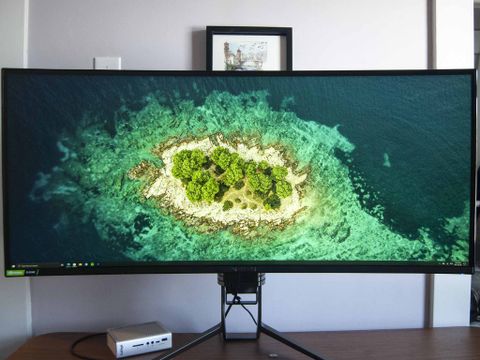
The Acer Predator X38 is a gaming-focused ultrawide monitor that undoubtedly has the right specifications and features to take on the best displays available today. It's enormous at 37.5 inches, its 3840x1600 resolution is crisp, and the 2300R curve sucks you in. Not only does it boast high-end gaming performance, it's also suited for productivity, photo, and video work thanks to its size and color reproduction. This is a single monitor that can replace all your other monitors, but is it really worth the price? I've been using the Predator X38 for a few weeks for everything PC-related to see what it's all about.
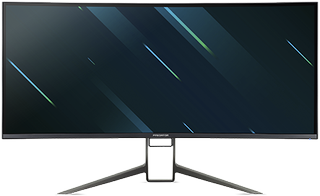
Bottom line: The Predator X38 is one of the best 38-inch ultrawide monitors on the market. High refresh rate, low response time, accurate color, crisp resolution, and enough space to see everything at once makes it the right choice for anyone who spends long hours (work or play) at a PC.
For
- Color accuracy
- Up to a 175Hz refresh rate
- 3840x1600 resolution
- Ergonomic stand
- Above-average audio
Against
- Expensive
- No USB-C or Thunderbolt 3
Tech Specs
Acer Predator X38 at a glance

The Predator X38 comes assembled out of the box; all you have to do is remove the protective foam, plug it in, and power it on. It's not the lightest monitor at about 20 pounds with the stand attached, but at this size it's not too cumbersome. Here are the exact specs that make up the monitor.
| Category | Spec |
|---|---|
| Screen size | 37.5 inches |
| Resolution | 3840x1600 (UWQHD+) |
| Panel type | IPS |
| Curvature | 2300R |
| Aspect ratio | 21:9 |
| Refresh rate | 144Hz OC: 175Hz |
| Response time | 1ms |
| HDR | HDR400 |
| Contrast | 1,000:1 |
| Colors | 1.07 billion |
| Brightness | 450 nits |
| Ports | HDMI 2.0 DisplayPort 1.4 Four USB-A 3.0 down One USB-B 3.0 up 3.5mm audio |
| Speakers | Dual 7W |
| VRR | NVIDIA G-Sync |
| VESA | 100mm x 100mm |
| Color | Black |
| Dimensions | With stand: 35.3 x 23.3 x 11.4 inches (89.66cm x 59.18cm x 28.96cm) |
| Weight | 14.2 pounds (6.44kg) With stand: 20.9 pounds (9.48kg) |
Yeah, it's big
Acer Predator X38 dominates your desktop




The Predator X38's main portion is made up primarily of plastic, with a vented back cover that doesn't add any RGB lighting. The stand has an aluminum frame with some plastic casing, but it all feels sturdy. Two arms on the stand spread wide enough to keep everything stable, and it's refined enough to not take up much room on your desk. For a monitor this large, that's important. There's lots of room between the arms to tuck away gadgets and accessories.
The stand allows the display to tilt back about 45 degrees for easy access to ports. Along a ledge near the bottom of the monitor are DisplayPort 1.4, HDMI 2.0, two USB-A 3.0 down, one USB-B 3.0 up, and a 3.5mm audio jack. A dedicated gap in the stand lets you pass cables through to keep them managed.
For easier accessory access, there are also two more USB-A 3.0 ports on the left side of the screen. The stand swivels about 45 degrees left and right, plus it has height adjustment. It falls to sit just inches from the desk, and raises enough that I haven't felt the need to use a separate riser. Bezel is narrow enough that you really don't notice it on a screen this size, and the monitor is relatively thin considering everything that's packed inside.

Just above where the stand attaches to the monitor is a vent with a fan behind it. Yes, the monitor requires its own cooling system, which isn't out of the ordinary for something like this. You can hear the display's fan in a silent room, but otherwise it shouldn't be any louder than the laptop or desktop you're using. No whine and no big changes to RPM. Be sure to enable "Deep Sleep" within the monitor's settings so the fan turns off when the display isn't in use.
Acer has also tucked a couple of 7W speakers in the Predator X38. As far as monitor audio goes, they're above average. There's not much bass and overall sound is a bit hollow, but it's still perfectly workable for podcasts or music while you work. An ambient light sensor is built into the top of the case for automatic brightness adjustments.

The on-screen display (OSD) menu is primarily controlled by a joystick on the bottom right of the back panel. There are also three slim shortcut buttons (which can be customized) and a power button. There are a number of preset picture modes to choose from, including the standard gaming, eco, movie, and graphics settings.
Getting into the main menu, you have access to picture, color, audio, gaming, OSD, and system settings. Here you can adjust the refresh rate from 144Hz to 160Hz or 175Hz, you can adjust backlight, blue light, and auto brightness, and you can adjust the sRGB color for SDR, DisplayPort, and HDMI. Moving through the menu is quick and intuitive, and I appreciate the customizable hot keys.
High-end in every way
Acer Predator X38 performance and color

There's no need for a multi-monitor setup once you start using the Acer Predator X38.
Acer went with an LG LM375QW2 IPS panel in the Predator X38, the same panel that resides in LG's own 38GL950G ultrawide gaming monitor. It's also similar to the panel in the LG 38WN95C-W without quite as many features. Nevertheless, it was an excellent choice that allows the monitor to be used for both work and for play. The 2300R curve is just right at this width, and the matte finish eliminates essentially all glare.
I can enable automatic brightness during the day and let the monitor do its thing while the lighting in my office changes. At night, the blue light filter comes on so I don't ruin my eyes. The ability to place three or four windows next to each other while working is an enormous boon, and there's absolutely no need to have a multiple-monitor setup. The Predator X38 does it all.
Using a standard light bleed test showed no bleed from the LED backlight. There is some IPS glow depending on the angle at which you're viewing the monitor, but facing it straight on eliminates anything noticeable. With a monitor this wide, that's a good thing. The backlight is flicker-free for easier viewing.
I primarily work with word processing, web browsing, photo editing, and email — general productivity stuff — and it all looks crisp and clear on the 1600p vertical resolution. Testing factory calibrated color reproduction with a Datacolor SpyderX Pro, the Predator X38 manages 100% sRGB, 90% AdobeRGB, and 96% DCI-P3. It also hits the Delta E<2 standard for any photographers and videographers out there who need exact color reproduction.
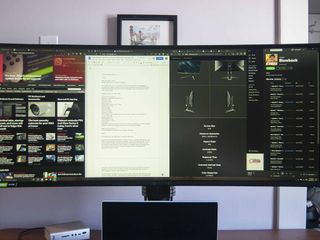
The Predator X38 is cut out for office work, but it really shines once you start gaming.
Though it's perfectly capable, Acer's Predator line isn't intended for office work. I almost felt guilty subjecting it to such boring fare. The X38 has a 1ms response time and 144Hz refresh rate as standard, overclockable up to 160Hz or 175Hz as needed. Whether or not you do need the boosted refresh rate depends on your PC, as it takes quite a bit of power to hit those frames at what is essentially a 2K+ resolution in most modern games. If you're working with a gaming PC that's more on the budget side of things, this monitor's specs and price are no doubt overkill. Check out our collection of the best graphics card options if you're in need of an upgrade.
Testing with an AMD Ryzen 7 5800X processor and AMD Radeon RX 6800 graphics card gets plenty of games close to hitting the monitor's overclocked ceiling, and the results are terrific. The monitor is equipped with the required processor for true G-Sync, but even without FreeSync to pair up with my Radeon GPU, games are stunning. VESA Certified DisplayHDR 400 is included for better movie watching and more vivid gaming in compatible titles.
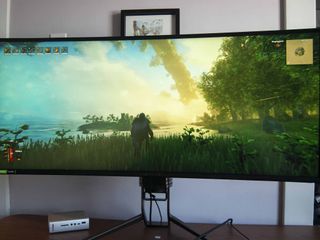
I've been using the Predator X38 for weeks, allowing me to test a number of different games. Valheim, a third-person survival game, translates well to ultrawide with its wide view of the surrounding countryside and any present danger. It's a gorgeous game anyway thanks to stellar lighting effects, and the view on the X38 when the sun comes up while sailing is incomparable.
First-person shooters look just as impressive, providing engagement that standard 16:9 gaming monitors don't come close to touching. Metro Exodus and its dark, grimy world was particularly gruesome on the X38. Playing some Age of Empires 2: Definitive Edition proves that seeing too much of the surrounding area is never an issue in RTS games. And as for racing titles, DiRT 5 might be the game I love most on the X38. I'm not usually one who enjoys a rally, but the wide view gives it an entirely new feel.
The monitor hit 453 nits brightness in testing. Combined with the matte finish, I've had no problems working during the day with sun streaming in. And with the blue light filter, gaming at night doesn't need to sear your eyes. One thing I would have liked to see is a motion blur reduction setting.
Prodigious Price
What you'll dislike about the Acer Predator X38
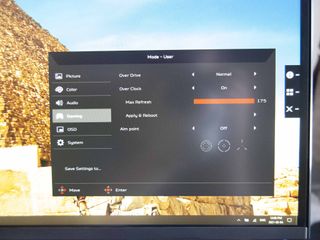
The Acer Predator X38 continues to impress me every time I sit down in front of it to work or to game. There are, however, a few things to point out that might sway you against a buy.
First is the relative lack of ports. Something like the LG 38WN95C-W 38-inch ultrawide packs in dual HDMI, Thunderbolt 3, DisplayPort, two USB-A, and a 3.5mm headphone jack. It also offers picture-by-picture, allowing for two inputs at the same time. The X38 does have more USB-A ports, but it otherwise falls behind in terms of connectivity.
The ambient light sensor's position at the top of the monitor makes sense until you want to add a centered webcam. Clipping on something like the Logitech BRIO 4K blocks the sensor entirely.
One other issue is the price, which can't really be helped. These monitors are a marvel so the cost is understandable, but most people aren't going to be able to justify buying one of these. I could buy a reliable used car for the price these go for in Canada. Does that mean I'm not considering saving up and getting one anyway? No. This monitor has stolen my heart.
If you can afford it
Should you buy the Acer Predator X38?
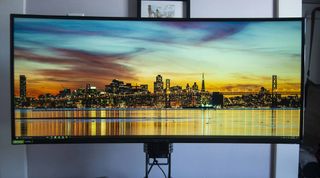
Who it's for
- Anyone who wants one monitor to rule them all
- Anyone with a powerful NVIDIA graphics card
- Anyone who can justify spending about $1,600 on a monitor
Who it isn't for
- Those with an AMD Radeon GPU
- Those who want RGB
- Those who need USB-C/Thunderbolt 3 or dual input
The ultrawide market is growing fast, especially now that we're seeing refresh rates, response times, resolutions, and colors match up with the standard 16:9 fare. Our collection of the best ultrawide monitors has a bunch of great options to browse.
The LG 38GL950G is essentially the same monitor with a different look. It uses the same panel, it has a maximum refresh rate up to 175Hz, and it has the crisp 3840x1600 resolution. The LG 38WN95C-W brings a few extra features like Thunderbolt 3, DisplayHDR 600, and FreeSync Premium Pro (as well as G-Sync compatibility), but it doesn't have as high a refresh rate. All monitors within this size and performance range cost about the same, with prices fluctuating due to availability.
As a bottom line, if you have the budget the Predator X38 is going to wow you. It doesn't make you choose between fast performance and poor color (or vice versa), and its size means you don't have to mess around with multiple monitors. Work during the day with ease, then game at night for pleasure. The Predator X38 has convinced me ultrawide is the only way to go for anyone who sits at a PC all day. Now it's just a matter of saving up enough to afford it. Have a look at our roundup of best PC gaming monitors too see how the X38 stacks up.

Cale Hunt brings to Windows Central more than eight years of experience writing about laptops, PCs, accessories, games, and beyond. If it runs Windows or in some way complements the hardware, there’s a good chance he knows about it, has written about it, or is already busy testing it.
